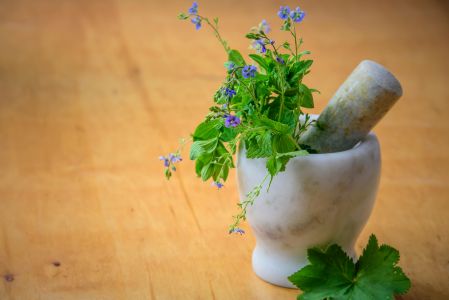In a world increasingly attuned to natural health and wellness, herbal remedies offer a time-honored approach to healing and maintaining well-being. These remedies, derived from plants and herbs, have been used for centuries across various cultures to address a wide range of ailments and health concerns. Whether you’re new to herbal medicine or looking to deepen your knowledge, this guide will explore the basics of herbal remedies, their benefits, and how to incorporate them into your life.
Understanding Herbal Remedies
Herbal remedies involve using plant-based substances to prevent, alleviate, or treat health conditions. These remedies come in many forms, including teas, tinctures, capsules, salves, and extracts. Herbs contain a variety of compounds, such as essential oils, alkaloids, and flavonoids, that can influence bodily functions and promote healing.
Key Benefits of Herbal Remedies
Natural Healing: Herbs offer a natural approach to health care, harnessing the power of plants to support the body’s innate healing abilities.
Fewer Side Effects: Compared to synthetic medications, herbal remedies often have fewer side effects. However, they can still interact with medications, so consulting with a healthcare provider is advisable.
Holistic Approach: Herbal medicine often takes a holistic approach, focusing on treating the whole person rather than just the symptoms of a disease.
Accessibility and Sustainability: Many herbs can be grown at home, making them an accessible and sustainable option for health and wellness.
Popular Herbal Remedies and Their Uses
Chamomile:
- Uses: Chamomile is widely known for its calming effects and is often used to relieve insomnia, anxiety, and digestive issues. It can also be used topically to soothe irritated skin.
- Forms: Herbal tea, tincture, topical cream.
Peppermint:
- Uses: Peppermint is commonly used to alleviate digestive discomfort, including indigestion and nausea. Its menthol content also provides relief from headaches and muscle pain.
- Forms: Tea, essential oil, capsules.
Echinacea:
- Uses: Echinacea is popular for its immune-boosting properties and is often used to prevent or shorten the duration of colds and flu. It can also aid in wound healing.
- Forms: Tincture, capsules, tea.
Lavender:
- Uses: Lavender is renowned for its calming and relaxing effects. It’s commonly used for anxiety, insomnia, and stress relief. Lavender essential oil can also be used for its antiseptic properties.
- Forms: Essential oil, tea, dried flowers.
Ginger:
- Uses: Ginger is a versatile herb used to relieve nausea, aid digestion, and reduce inflammation. It’s also used to combat colds and flu.
- Forms: Fresh root, tea, capsules, tincture.
Turmeric:
- Uses: Turmeric contains curcumin, a powerful anti-inflammatory and antioxidant compound. It’s used to support joint health, improve digestion, and enhance overall wellness.
- Forms: Powder, capsules, tea.
Garlic:
- Uses: Garlic is known for its cardiovascular benefits and is used to lower blood pressure, improve cholesterol levels, and support immune function. It also has antimicrobial properties.
- Forms: Fresh cloves, capsules, tincture.
St. John’s Wort:
- Uses: St. John’s Wort is primarily used for its antidepressant effects and is often used to manage mild to moderate depression. It can also help with anxiety and sleep disorders.
- Forms: Capsules, tincture, tea.
Rosemary:
- Uses: Rosemary is used to improve memory and concentration, relieve headaches, and support digestive health. Its essential oil is also popular for its invigorating and soothing effects.
- Forms: Fresh or dried herb, essential oil, tea.
Valerian Root:
- Uses: Valerian root is used to promote relaxation and improve sleep quality. It’s commonly used as a natural remedy for insomnia and anxiety.
- Forms: Capsules, tea, tincture.
How to Use Herbal Remedies Safely
Consult with a Professional: Before starting any new herbal remedy, consult with a healthcare provider, especially if you’re pregnant, breastfeeding, or taking prescription medications.
Start with Small Doses: Begin with small doses to gauge your body’s response. Herbal remedies can be potent, and it’s important to monitor how you feel.
Check for Interactions: Be aware of potential interactions between herbs and medications. Some herbs can affect the efficacy of certain drugs or cause adverse effects.
Quality Matters: Use high-quality herbs from reputable sources. The potency and safety of herbal remedies can vary based on their source and preparation.
Follow Dosage Recommendations: Adhere to dosage recommendations provided on herbal products or by your healthcare provider. Overuse of herbs can lead to adverse effects.
Incorporating Herbal Remedies into Your Life
Grow Your Own Herbs: Starting an herbal garden is a great way to have fresh herbs on hand. Many herbs are easy to grow and can thrive in small spaces.
Make Your Own Remedies: Experiment with making your own herbal teas, tinctures, and salves. This allows you to tailor remedies to your needs and preferences.
Educate Yourself: Continue learning about herbs and their uses. Books, online resources, and workshops can provide valuable information and help you use herbal remedies more effectively.
Integrate into Daily Routine: Incorporate herbal remedies into your daily routine for general wellness. For example, enjoy a cup of chamomile tea before bed or use peppermint oil for a refreshing boost.
Herbal remedies offer a natural and time-tested approach to health and wellness. By understanding the properties and uses of various herbs, you can harness their benefits to support your well-being and enhance your self-care routine. Remember to approach herbal medicine with respect and mindfulness, and always seek guidance from qualified professionals when needed. Embrace the power of nature’s gifts and enjoy the journey toward holistic health and healing. ???


